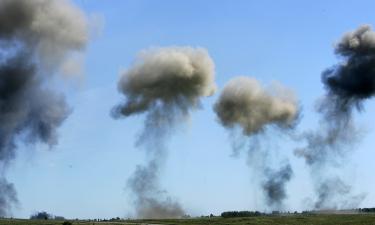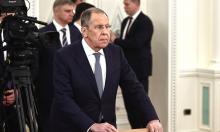UN Climate Change Conference: Russia won't play poker, if the West stops playing shell game
The upcoming UN conference on climate change in Glasgow was supposed to show the world the triumph of the United States and the European Union as trendsetters for everything "green". Unfortunately for them, Europe faced an unprecedented energy crisis, which called into question not only the competence of officials from Brussels, but also the feasibility of the strategy to switch to green energy as soon as possible. Russia, which did not want to dive into the whirlpool of decarbonization, found itself in a more advantageous position. Nevertheless, Moscow has something to show in Glasgow on the climate agenda.
China, the United States and India altogether account for more CO2 emissions than all other countries combined. Russia accounts for less than five percent, but the anger of Western politicians and journalists, who propagate environmental slogans, is directed primarily at Russia. Such a biased attitude towards Russia is based on the laws of hybrid war: dirty propaganda should keep citizens in good shape, while raising the degree of hatred.
EU demonises Russia and wants more Russian gas
When European politicians accuse Russia of the gas crisis, their accusations fit into the anti-Russian agenda just as perfectly. Gazprom strictly fulfills all of its contracts, but this argumentation falls on deaf ears in the EU. For example, EU chief diplomat Josep Borrell saw "deep geopolitical roots" in the rise in energy prices. The head of the European Commission, Ursula von der Leyen, reproached the Russian gas monopoly for "not responding to higher demand" in Europe. Her compatriot from the Green party, claiming the portfolio of the Minister of Foreign Affairs of the Federal Republic of Germany, Annalena Baerbock, stated that Russia was "playing poker" in matters of gas supplies. She has an ironclad argument: after all, European gas storage facilities are comparatively empty.
If European bureaucrats do want to make a real mess of things in energy policy, they can go ahead and do it, albeit not at Russia's expense. After so many years of pressure of sanctions and demonisation of Russia, they still think that they are entitled to demand additional gas supplies from Gazprom. Konstantin Kosachev, the vice-speaker of the Federation Council, rightly noted that Russia would not come to the rescue of Europe just to compensate for the mistakes that Russia did not make, taking into consideration the fact that the EU threatens Russia with carbon taxes at border.
Like the United States, the European Union follows the confrontational line of behaviour in relations with Russia. This impedes not only the mutually beneficial trade, but also the joint solution of a plethora of global problems. According to Vladimir Chizhov, Russia's Ambassador to the EU, the decision of the European Union to treat Russia as a geopolitical adversary does not facilitate dialogue with Moscow. The essence of the problem lies in the wording: if one replaces the word "enemy" with "partner", one would be able to cooperate a lot better, he said.
The desire of the European Union to follow the green path faster is understandable. Europe's fossil fuels are primarily sourced from the outside, and this applies to as much as 90 percent of natural gas. The movement towards the carbon-free future is fueled by ideological reasons and ill-concealed irritation over EU's dependence on the Russian natural gas. Brussels would be happy to bid farewell to it even tomorrow, if it could be possible.
The 2021 Leaders' Climate Summit was held in April. President Vladimir Putin said during his speech at the summit that:
- compared to 1990, greenhouse gas emissions in Russia decreased from 3.1 billion tons of CO2 equivalent to 1.6 billion;
- that 45% of Russia's energy balance accounts for low-emission energy sources, including nuclear power;
- a pilot project has been launched in the Sakhalin region of Russia to create a carbon trading market in order to achieve carbon neutrality in the region by 2025.
The Russian President suggested looking for ways to comprehensively address emerging climatic problems. It would be more appropriate to deal with the absorption of carbon dioxide accumulated in the atmosphere. It is worthy of note that Russia makes a huge contribution to the absorption of global emissions (both domestically and internationally), due to the absorption capacity of its ecosystems, which is estimated at 2.5 billion tons of CO2 equivalent. It was also proposed to halve the emission of methane in the next 30 years, given that the greenhouse effect of methane is ten times greater than that of CO2.
Climate issues require global approach, such as, for example, joint scientific research, investments in significant climate projects, the development of low-carbon technologies, etc.
At the end of June, Alok Sharma, chairman of the climate summit of the 26th session of the Conference of the Parties to the UN Framework Convention on Climate Change (COP-26), paid a work visit to Moscow. He called on Russia, as a member of the G20, to join "the movement to achieve zero emissions by mid-century, which is crucial for limiting temperature rise to 1.5 °C." Alok Sharma called the upcoming summit "the last hope and an excellent chance" to achieve the set goal. He recommended Russia could derive profit from switching to a cleaner and greener economy.
It is difficult to say whether the arguments expressed by the COP-26 chairman produced an impression on Moscow, but one could indeed notice considerable changes in Russia's climate policy lately. During the Russian Energy Week International Forum, President Putin said that Russia set a benchmark for the economy to reach carbon neutrality by 2060.
Russia is fully aware of climate challenges. Average annual temperatures in the Russian Federation rise 2.5 times faster than global temperatures, whereas the temperature rate in the Arctic is even higher. Russia already has to deal with negative consequences of climate change in the form of forest fires in Siberia and the melting of permafrost in areas with oil and gas infrastructure.
The Russian authorities currently develop a new strategy of the country's socio-economic development before 2050 with a low level of greenhouse gas emissions. The strategy stipulates for a slight increase in greenhouse gas emissions until 2030 (by 0.6%) and their reduction by 79% from the current level by 2050. Due to measures in forestry and agriculture, the absorbing capacity of ecosystems should increase 2.2 times.
China shows no green interest
Interestingly, Chinese President Xi Jinping refused to participate in the upcoming conference in Glasgow in November. British organisers of the forum fear that China's move may herald Beijing's refusal to set new targets on climate change amid the energy crisis.
Saudi Arabia's Energy Minister Prince Abdulaziz bin Salman advised the governments calling for carbon neutrality should first make sure that the plans that they announced could be realistic and achievable. Wealthy countries of the Persian Gulf do not need money, but they do talk about the need for collective efforts to create technologies to reduce impact on the climate. There is no need to look for trade-offs to the benefit of energy security or climate change — they must go hand in hand. Otherwise, we all might be gone with the wind.
Subscribe to Pravda.Ru Telegram channel, Facebook, RSS!




